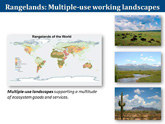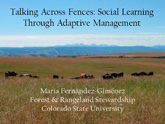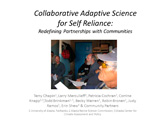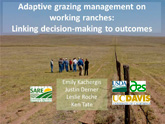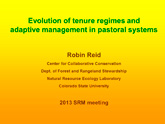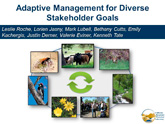Adaptive Management of Rangelands: Science, Practice, and Partnership
Special Symposium of the Society for Range Management 66th International Meeting - January 2013
Worldwide, rangeland ecosystems represent the largest and most diverse land resource, providing multiple ecosystem goods and services to both local communities and the larger public. Traditionally, rangeland science and management have focused on agricultural production, with the goal of securing the nation's food supply; however, society now places growing importance on provisioning of additional services, such as water quality, wildlife habitat, and alternative energy development. Balancing multiple conservation and agricultural production goals on rangeland agroecosystems in an economically realistic manner will be a key challenge in an already variable and changing environment.
Adaptive management, or applying the principles of experimental design to natural resource management, allows individuals and institutions to learn from management actions and make necessary adjustments as conditions change. Collaboration among scientists and managers facilitates learning in adaptive management by creating a dialogue through which participants discover how to achieve their interests while also re-examining their views. Although collaborative adaptive management is uniquely suited to providing solutions to today's rangeland conservation challenges, integrating this concept into a research and management framework is in itself a challenge. This session brought together scientists involved in a diversity of projects to discuss opportunities and challenges for collaborative adaptive management on rangelands.



